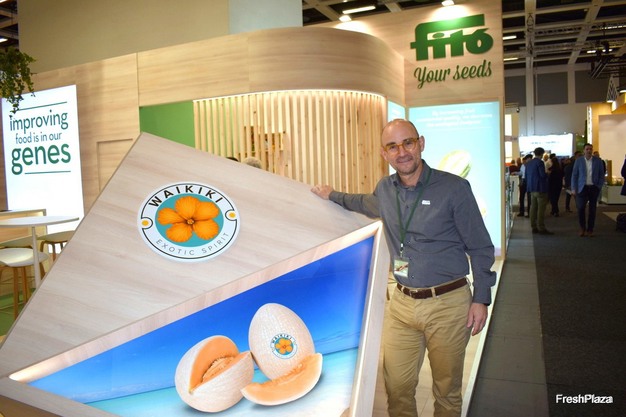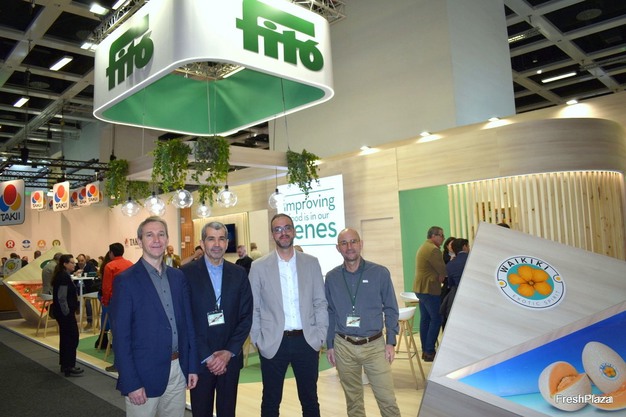Semillas Fitó has been in the business for five generations, since 1880, producing seeds for fruit and vegetable crops that are currently supplied to around 90 countries. It has positioned itself as a leader in eggplant and as a significant supplier of cucumbers, melons, and tomatoes.
Fruit Logistica, in Berlin, was the venue chosen by the Spanish seed house to unveil its Sustainability Plan for 2026. It also revealed its strategy as a global expert partner and confirmed its clear commitment to continue developing consumer brands.

"We will continue to focus on the crops we are already working with, which we consider strategic, in order to provide the best genetics to our customers," said Israel Roca, Global Director of Marketing and Sales for Vegetables at Semillas Fitó. "Our goal is for anyone who plays a role in the fruit and vegetable sector and works with our crops in any link of the value chain to see us as an expert partner able to provide solutions."
"We don't want to be just another seed house," said Vasco Vital, Sales Director for America at Semillas Fitó. "Our slogan, 'Improving nutrition is in our genes' aims to convey how we perceive the sector to the entire value chain. We aim to provide added value to all involved, not just in seeds, trying to improve the sector in general; providing solutions to the end consumer, as well as more sustainability to the planet. How? With products with greater resistances, which help reduce food waste."
Developing solutions for the entire agri-food chain
"Producers want volumes, the seed house needs good germination, the retailer demands a long shelf life, the consumer wants a good taste… It's a never-ending job, because the needs of all parts of the chain are always changing, so we too continue to evolve," said Israel Roca.
"It's true that in the past we were quite focused on the producers, who had the most decision-making power in our genetics," says Raúl Martínez, Sales Director West EMEA at Semillas Fitó. "Today, large supermarket chains are playing an increasingly important role and, of course, consumers are the ones who choose the products. New consumption trends are mainly shaped by the new generations and by immigrants in the countries where they reside, and this is driving change in our genetic programs."
"As far as the consumer is concerned, we will continue to add value through brands, which make the product more recognizable and motivate repeat purchases, something we have already achieved with Waikiki melons, Monterosa, and Wabi-Sabi tomatoes or CRÜ zucchini," says Raúl.
"Think globally, act locally"
40 years ago, most of Semillas Fitó's sales were made in Spain. Since then, the company has expanded to about 90 countries, thus ensuring a global vision.
"We have a great team of more than 800 people spread out all over the world, with a wide cultural diversity that helps us understand the needs of all customers in each country. No one said it would be an easy task, but adaptability to each producing region and to each customer and their culture is crucial in providing value," says Hatem Abdeen, Sales Director for the Middle East and Asia. "We are global, so we share the same values in all countries: long-term vision, teamwork, closeness to our customers, and professionalism. We open a subsidiary every two years, which makes things more complex. We never want to lose our identity as we grow."

Raúl Martínez, Hatem Abdeen, Vasco Vital and Israel Roca at Fruit Logistica 2024.
Providing complete resistance packages and the global circulation of seeds: the big challenges
One of the biggest challenges, according to Hatem, is managing to provide a complete package of disease resistances. "Due to the effects of climate change around the world, we are facing increasingly more diseases that many seed houses cannot fully tackle. It's a big challenge for the entire industry, not just for us."
"We need to think sustainably, focusing on genetics that will withstand high temperatures and drought. In our Sustainability Plan, one of our most important projects is to develop disease-resistant varieties, with lower water needs, reduced waste, a lower carbon footprint, etc.," says Vasco Vital.
Another big challenge for the entire sector, according to Vasco, is the global circulation of seeds. "When the pandemic broke out around the world, the seed sector's globalization was reshaped, especially as regards circulation between different countries. Moving goods from one place to another became more complex. Looking ahead, this is a huge challenge for the seed sector."
Semillas Fitó opened its Indian subsidiary in 2014 to better meet the needs of producers in Southeast Asia, addressing the challenges of climate change and improving nutritional value in this country. "The Indian seed industry is at the forefront in terms of innovation, focusing on areas such as pest and disease-resistant seeds, drought and heat-tolerant varieties, and the search for more nutritious options in order to address the challenges of climate change and improve the products' nutritional value," said Enrique Roca, Sales Director for South East Asia.
"It is of utmost importance to plan the production according to the needs of the population. India is the second-largest producer of vegetables, with 2.8% of the total cultivated area. Vegetable production also needs to increase by 2.5% per year. The current production of 1.5 million tons of vegetables only covers 145 grams per capita per day, lower than the recommended 300 grams per capita," says Enrique Roca.
"In the next 5 years, we will achieve the most growth in America"
Semillas Fitó believes there are many opportunities in the North American market. Vasco Vital says that "in the next 5 years, we will surely achieve the most growth in America. In the last 20 years, Mexico has been becoming the largest producing and exporting hub for vegetables in North America, displacing the United States and Canada. That's why we are opening new research centers, aiming to put a greater focus on this country."
"However, investments are spread across all territories, and for this reason, we are trying to open a new subsidiary every two years. This is helping consolidate our presence in the East EMEA region. Also worthy of note are the recent investments in our biotechnology center and quality control laboratory, which are helping support Semillas Fitó's continuous growth in recent years with rigorous science."
 For more information:
For more information:
Neus Fernando
Semillas Fitó
Tel.: +34 933 036 360
Mob.: +34 699 919 582
[email protected]
www.semillasfito.com
